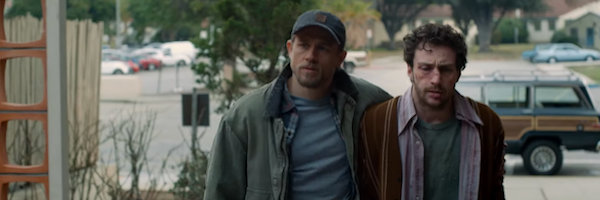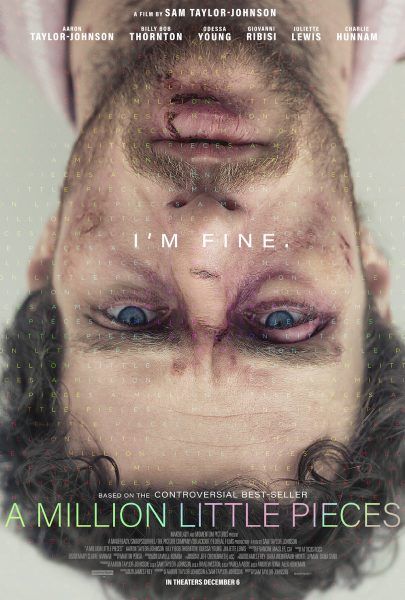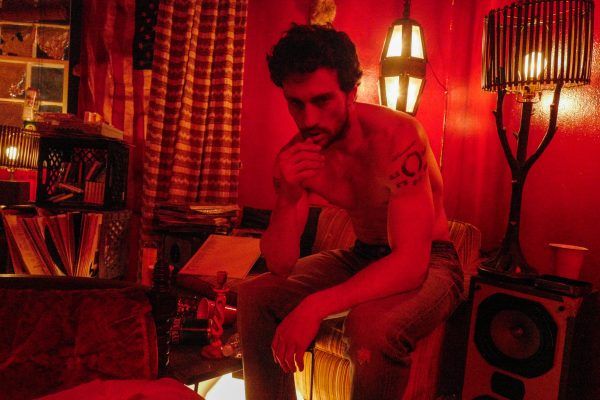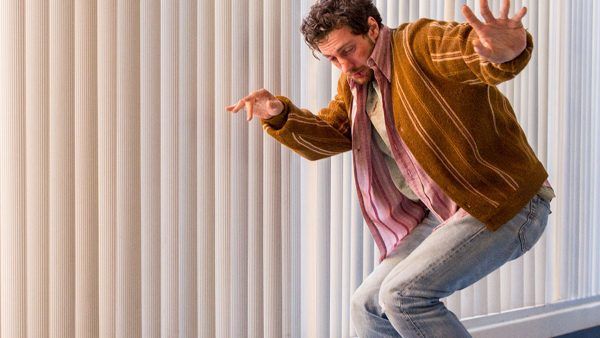From co-writer/director Sam Taylor-Johnson, the indie drama A Million Little Pieces follows James Frey (Aaron Taylor-Johnson, who also co-wrote the film), a 23-year-old alcoholic and drug addict who is faced with the decision of treatment or death. Once in rehab, detox and therapy leads him on a journey of healing his soul, while connecting with the other addicts around him and making amends with his family. The film also stars Billy Bob Thornton, Juliette Lewis, Giovanni Ribisi, Charlie Hunnam and Odessa Young.
During this 1-on-1 phone interview with Collider, actor Aaron Taylor-Johnson talked about the screenwriting process, the challenges of an indie film schedule and budget, the demands of a role like this, being surrounded by such an incredible cast of actors, and what makes his wife, Sam Taylor-Johnson, such a natural storyteller. He also talked about the experience of working with director Christopher Nolan on Tenet, and why the filmmaker that he’ll be working with is the top priority for him, when it comes to finding the next project.
Collider: With a project and character like this, it seems like you just have to completely throw yourself into it, entirely.
AARON TAYLOR-JOHNSON: Yeah, that character and a role like that really demanded for me to really dive into such a vulnerable space and a very exposing space, playing James Frey. He goes through such a very visceral journey in the book, and it was all in his head. And it was also first-person. So, to try to adapt that onto the screen, it just felt like all I could give was a physicality to it. What he went through, after the book, with the controversy, was just so a raw and exposing. That’s how we tried to open up the movie, from the beginning. It was just about figuring out how to embody it.
Was there ever a time where you thought, “What did I get myself into? Why am I doing this to myself?,” either while you were writing the script or during the shoot?
TAYLOR-JOHNSON: Yes and no. I definitely feel like, as an actor, I just want to be challenged and pushing myself to a place where I feel scared and vulnerable. That’s the only test or challenge, when I feel like I’m balancing on a tightrope and I somehow have to get to the other side. I have to balance on the filmmaker, the actors around me, the story and the narrative, and hope that I’ve embodied that character, as best I can. And also, I wanted to try to be authentic and true to the experience of any addict. I drew upon a bunch of friends that are close to me, some of which are still struggling with addiction, some are celebrating sobriety, some have relapsed, and some are sadly not with me anymore. So, I felt like I owed it to them, to not just play it, but to just be stripped of everything and expose everything. Yeah, there were times where we’d written something and decided, “That’s gonna be great for the story. I can wear both of those hats, and this is gonna be fantastic and be great in it.” But at the end of the day,” I’ll go, “Oh, shit, I’m the actor, and now I’m the one who’s gotta do what it says on the page. That’s mad.” But at the same time, I’ve gotta throw that away, and there are people around me, who are relying on me to do that and to go to those dark places. It was a huge experience, making this move, and an ultimate challenge, in many aspects of it. It definitely challenged me. I experienced lot, through the making of this film, from every angle.
When you’re playing a guy like this, who is stripped of all inhibitions, were there ever times that you had to get out of your own head? Did you ever catch yourself overthinking it and had to remind yourself that he wouldn’t have been thinking about it, at all?
TAYLOR-JOHNSON: Yes. We shot this in 20 days and we were on a very tight budget. We shot it super quick, and we were lucky, if we got a take two or three, at max. We never went past that. We just didn’t have time for it. And what that does is it very quickly disciplines the set, the crew, and the cast. You have no choice but to be guttural, instinctive, and present. There’s no time to be out of body, or analyzing, or thinking about whether you could have done that delivery a bit better. There none of that. There’s no moment where you can go back and re-edit it, the way that you do, when you sit outside of your body while you’re in the scene. If you do, the camera will catch it, and it will ring false. So, I needed to go to that place and try to just be present in it. It was uncomfortable and not easy. I drew upon the experiences around me, what I’ve seen, and what I may have been through, and try to put it all together and allow it to feel like it should.
Does it also help to be surrounded by such an incredible cast of actors, who all seem like they’d be pretty game for anything you could throw at them?
TAYLOR-JOHNSON: A hundred percent. We were extremely fortunate to have gotten such a well-seasoned cast of actors, with Juliette Lewis, Billy Bob [Thornton], Giovanni Ribisi, and Charlie Hunnam. They all gave so much, as actors. They turned up, fully like prepared and immersed in their characters and had done their bit of research and study. When we sent the script out, to crew and actors, to get who we wanted, we’re very lucky to have gotten the people that we went to first. We were so surprised, when it went out on Friday and, after the weekend, they came back on Monday and said, “Yeah, we’re in.” And I think it really spoke to them, on a personal level, whether they’d been through it themselves, or someone very close to them had been through it, it just touched them in a way that related, on some scale. Everyone had their own personal story and journey, through this one. We all leaned on one another to try to elevate the scenes, as best we could. Sam [Taylor-Johnson] and I spent almost two years writing the screenplay, so we were very, very fortunate to then have those actors bring it all off the page and make it feel as real as possible.
You and your wife, Sam Taylor-Johnson, do great work together. What do you think it is about her, that makes her a great director and a great storyteller?
TAYLOR-JOHNSON: She’s a natural storyteller. It’s clearly what she was meant to do, and she’s pretty gifted at doing it. Sam’s a very instinctive director. She’s very collaborative, and it’s very deep within. It’s very guttural. She’s able to create an environment that feels secure and safe, and the actors can then experiment and explore, within it. To be honest, in order for actors to do that best work, they need trust and they need to really believe in the director’s vision. Then, you’re not thinking selfishly. You’re not on pilot mode, doing what you usually do and playing it safe because you know it works, every time. Sam doesn’t get performances like that. You don’t get well-seasoned actors, if you don’t have a filmmaker like Sam. Obviously, a lot of what I’m saying sounds biased, but all you’ve gotta do is look at the pedigree around, from the cinematographer to the score to the actors that you see in it. She’s a naturally gifted collaborator, who’s able to get across and articulate what she wants, without seeming condescending. She has never raised her voice. She’s an optimist. I’ve seen all of the challenges and obstacles thrown our way, and that would make anybody go, “What’s the point? I can’t be bothered. That movie is never gonna get made. I can’t deal with that.” Or they’d shout and jump up and down. It doesn’t phase her. It doesn’t bother her. It’s not that it doesn’t bother her, she’s just really great at being able to be compassionate and empathetic, and still somehow get across what she wants, without it being troublesome. It’s quite a gift. It’s what makes her a good director. Also, on a film set, everyone looks up to the director. It’s the director’s set. If the director’s energy is amazing, then the rest of the set is amazing. That feels great, and it’s conducive to good work. Everyone is like, “I wanna be able to do the best I can do,” with whatever it is. I’d work with her, every time over. She’s gifted.
I know you can’t talk specifics about doing a film like Tenet, with Christopher Nolan, but what it’s like to work with a filmmaker like Christopher Nolan? What was it like to collaborate with him on set and to watch him work with actors?
TAYLOR-JOHNSON: I love Christopher Nolan movies. When there was an opportunity to try to go for a role in any one of his movies, I’ve been the first person to have my hand up, saying, “Let me try.” I was very fortunate and lucky to have been accepted into the cast of Tenet. John David Washington is phenomenal and incredible, and a wonderful, genuine guy. He’s gonna be a star. Robert Pattinson is brilliant and great. I loved working with him. Working with Nolan is working with a legend. It’s about being able to stand back and observe how his mind works. How he is, as a filmmaker, and how he puts his films together is quite extraordinary. There’s no expense spared. He’s definitely trying to push the boundaries of cinema, in high concepts and sci-fi concepts, and the cinematic side of things is extraordinary to watch. It was a real honor and pleasure to be in his presence, and to work on that movie. But to be honest, there’s nothing else I can really say about it.
Obviously, it starts with the script because that’s the first thing that you get to look at, but is the filmmaker equally as important, for you?
TAYLOR-JOHNSON: I put it as the most important thing. I once had Harvey Keitel say, “It’s all about the script, the script, the script,” and then it’s whatever. That might have been true, at one point. And I disagree that, without a good script, you haven’t got anything. If you listen to and read great writers’ screenplays, from Aaron Sorkin to David Mamet to John Logan, then you understand. For me, I’ve worked on some movies, in the past, where the script wasn’t everything for me. I responded to the story and I loved the character, and then I’d jump on set and not connect with the filmmaker, or I didn’t know or like the filmmaker’s work, and we’d clash and not see eye to eye. Then, you’re on a journey, where you’re just not seeing eye to eye or collaborating.
I started to learn, very quickly, once you follow a filmmaker that you admire, you enjoy watching, and you want to learn from and observe, then you can’t go wrong. Whether they’re nice or not might factor in it, afterwards. You might have a bad experience, and that’s fine, but at the end of the day, you’re not gonna be upset with the project or the role that you chose because you chose it for one very strong reason, and it was to be under the hands of that filmmaker. I wanna put my trust in the palm of my filmmaker’s hand. When I do that, I’m giving over everything to them and I’m like, “What do you want me to do, ‘cause I can do it in a variety of ways.”
When you do that, you feel more free and confident to play and experiment, and put yourself out on the line, and not necessarily look good. There are moments in A Million Little Pieces that are not very flattering. It’s not a vanity project. There are times with these characters where you’re seeing their soul and it’s ugly, and that was the point. I wanted to be able to show the destruction, and that’s not pretty. It’s hard because you’ve gotta put yourself aside. I’m trying to push my craft, as much as possible, but I also wanna just be able to put myself in the filmmaker’s hands.
A Million Little Pieces is now playing in theaters.




